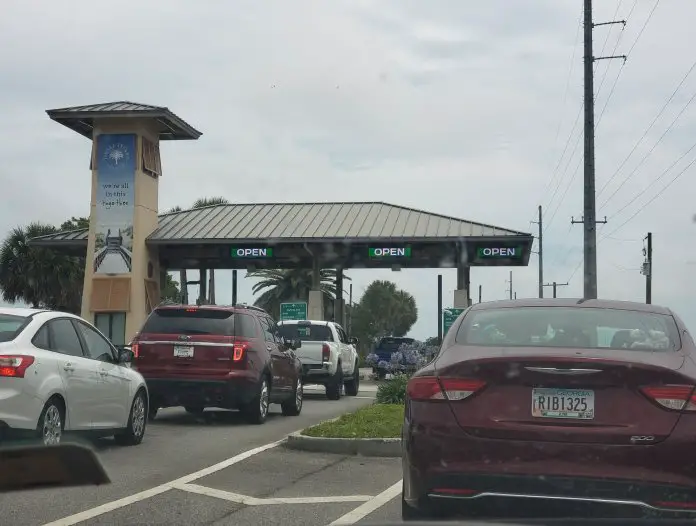TYBEE ISLAND – Tybee Island Mayor Shirley Sessions published a video at the outset of what is typically a lucrative Memorial Day weekend for her city’s businesses with a simple message: Don’t come.
That’s because so many people were already on the three-square miles of barrier island with more on their way, there just wasn’t any room left.
“It’s Memorial Day all over Tybee Island, our beaches are full to capacity, our parking spaces are … there’s none available, and we’re asking if you’re planning to come to Tybee today, don’t,” Sessions said. “It’s not going to be a good experience because there are no parking places. People are getting ticketed for parking illegally.”
A lot of people disregarded her advice.
The traditional beginning of the summer beach season combined with a lot of people aching to get out of the house to jam Georgia roads east of I-95. Bars and restaurants can now open dining rooms with new safety guidelines and tourists flocked to the ones that did.
The vast majority of people out on some of Georgia’s most popular beaches weren’t wearing masks in spot checks, despite continuing state guidelines that they should still do that and take other safety measures to try to contain COVID-19. Beach goers over the holiday weekend tended to gather near access points rather than spread further along expanses of sand. At Tybee’s beach, the packed-in crowds and lack of preventive measures taken made the scene indistinguishable from any other Memorial Day weekend.
Clogged roads led to the causeways and toll booths that stand between the mainland and Georgia’s barrier islands. Around 1:30 p.m. Saturday, according to Google trip calculations, it would take a visitor from Savannah between an hour to an hour and a half to get to Tybee 18 miles away, a good portion of which was spent idling in gridlocked traffic that ended on U.S. 80 near Goat Point and started as far back as Wilmington Island.
If you could stand the 91 degree heat Saturday afternoon, it would’ve only taken an extra 30 minutes to peddle a bicycle from Savannah to Tybee.
Not that one of the coast’s biggest boosters of bike transportation was interested in getting into the bustle of traffic making the Savannah-Tybee trip this weekend. Savannah resident and Safety Education Programs Manager for Georgia Bikes John Bennett said he enjoys going out to Tybee, but the next time he does is more likely to occur on a rainy Tuesday. Part of that is because he fears a coronavirus outbreak might be fueled by summer’s beach season.
“I’d like to live in a place where people want to be, and I understand that,” Bennett said. “And doing the kind of work I do for Georgia Bikes, it’s been really gratifying to see so many people out walking and riding bikes and all that stuff, all that is great, but it’s troubling, for sure.
“I want people to be able to come back to Savannah. So many people are in terrible positions right now because their industry is shuttered, or was. The tension is really palpable here.”
Gov. Brian Kemp recently eased some of the restrictions he imposed on businesses during April when he issued stay-home orders to contain the spread of the coronavirus. In late March, local governments along the coast including Tybee Island closed beaches during spring break season to discourage visitors. Kemp’s emergency orders overruled the ability of local governments to set their own guidelines or close beaches.
At a Thursday press conference he urged people to adhere to the continuing guidance that they maintain social distancing, wear masks in public and observe other safety measures.
“This Memorial Day, I want to encourage and wish everyone to have a good, safe weekend, following the public health guidelines, that (are) working here in our state,” Kemp said.
Kemp allowed many restrictions on businesses to expire at the end of April with several of the safety guidelines still in place and soon it was clear compliance along the coast would be a mix of masked faces and apparent indifference to the pandemic even as it continued to kill Georgians and erupt in new hotspots.
The potential spread of the novel coronavirus during visits to Tybee Jekyll and St. Simons islands the Memorial Day weekend isn’t just a health concern for Georgians, but also for the visitors from many other states who spent their weekend on the state’s 110 miles of coast. The majority of car tags in a dashboard survey seemed to represent the Eastern Seaboard, from Pennsylvania, Virginia to the Carolinas.
Virginia Gov. Ralph Northam allowed Virginia Beach to reopen Friday, but most of the state’s other beaches are indefinitely closed. North Carolina’s beaches opened up under restrictions May 8. Like Georgia, many South Carolina destinations saw heavy traffic over the weekend.
State-owned Jekyll Island was an easier beach to hit to avoid the parking and traffic headaches at commercial destinations like Tybee and St. Simons islands. But even at Jekyll’s less-visited beach access at the soccer fields, the parking area filled up by early afternoon Sunday and overflowed into nearby parts of the island.
National news reports over the weekend showed crowded beaches and boardwalks from Missouri to Texas to Maryland as many states ease restrictions on public interaction imposed last month. But the packed pool parties and floating bashes are discouraged just about everywhere.
Last week, Georgia’s Department of Public Health Commissioner Dr. Kathleen Toomey announced the state is entering a new phase in its battle against COVID-19, a contact tracing effort to identify people who might have infected others with the disease. If Georgia beach visitors did help spread the coronavirus over the holiday, the public health system appears better prepared to respond than during spring break in March.
As of Monday evening, there were 43,400 positive cases of COVID-19 in Georgia, and 1,848 deaths were attributed to the virus. Nearly 513,545 tests had been administered.


